‘We need to talk about this’: KI town’s message after tragic suicide
Simon Wheaton was a pillar of the KI community who took his own life. As his family and friends struggle to make sense of his death, they are working to make sure it never happens again.
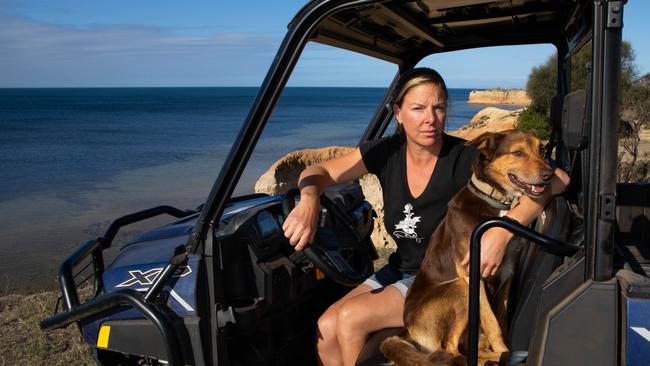
SA Weekend
Don't miss out on the headlines from SA Weekend. Followed categories will be added to My News.
Kind thoughts and hopes. It was a phrase you’d expect from a man so good with words, but no one could have believed it was his final public statement.
Simon “Dippa” Wheaton was a man who served his community. A loving husband and father of two young men working an island farm. A true leader. Kind-hearted. Selfless.
Then, tragically, at age 43, Simon took his own life after a long battle with depression.
His death has hit the tight-knit Kangaroo Island community particularly hard.
It is a gut wrenching pain from which they are struggling to recover.
But all agree there is only one way forward: “We need to talk about this.”
Only wife Eloise and sons Kayne, 20, and Toby, 18, knew how relentlessly the black dog had hounded Simon.
“He was a highly functional person who had depression so I think he was used to hiding everything to the general public,” Eloise says from the Red Banks farm where she worked with him for 12 years.
Toby agrees: “It was easy for Dad to put on a brave face and be outgoing and normal like he always was. It would have been quite hard for people to know what he was struggling with.”
In the four months leading to his death in August last year, Simon had attended regular sessions with a counsellor, and then a psychologist, in an attempt to gain control of his darkness.
“At the time, he didn’t know why he felt so down,” Eloise says.
“He had a great family, who loved him and had everything going for him in life but he still felt like he didn’t want to be around.
“He felt he had no right to feel so sad. That was really hard to hear.”
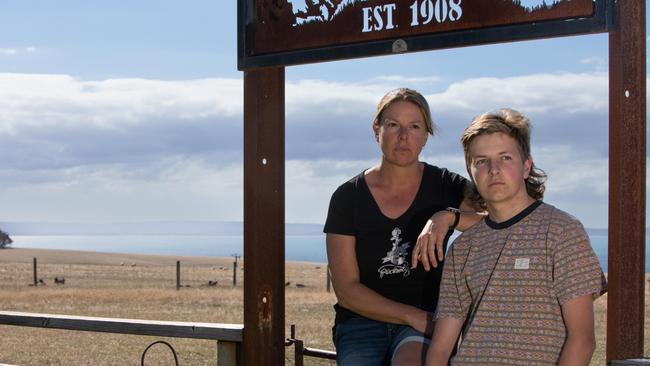
This suffering was lifelong. Eloise says Simon’s mother had caught him trying to take his own life at the age of 12.
“He told the psychologist that he didn’t know what caused it at the time – he just felt
s--t and hated himself,” she says.
“Simon had said that there was no discussion with his parents as to why he tried to do that, and it wasn’t talked about any further – he didn’t get any help.”
Following an extended family gathering last May, his behaviour reached a crisis point.
“That night he was all over the place – confused and emotional,” Eloise says.
“He was angry to start with and then broke a window and he didn’t really know why. It was shocking for me and I didn’t know what to do. The boys were here and it was scary for them too.
“He knew he had a drinking problem and he was using it to escape his own demons but it actually made it worse; it was like a spiral.”
Kayne adds: “He was a blubbering mess.
“I was gobsmacked – it’s very tough to see your dad like that. He was borderline suicidal and he was terrified of it.
“Considering what happened when he was a kid, 30 years is a long time for someone to not like their own company.”
Eloise says Simon was reluctant to get help “but he knew he needed it, so he got the guts up to go and see a doctor, then a counsellor and on to a psychologist”.
“No one wants to admit they have issues, let alone talk about them especially when you’re a 43-year-old man,” she said.
Simon was prescribed a low dose of antidepressants which levelled his moods but, a week before his death, his psychologist decided to increase the medication.
“Because of Covid, the psychologist wasn’t on the island and she couldn’t give him the script to get that medication straight away,” Eloise says.
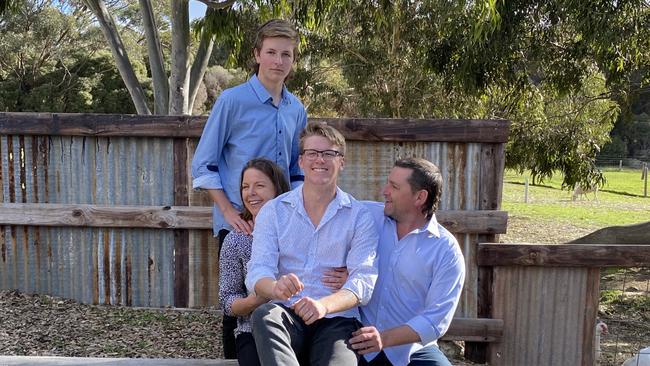
“He had to book an appointment to go see the doctor for it – and that was organised for the day he was found. I don’t know if it would have made any difference but it was daunting for him to have to go to that. He didn’t want to.”
The night of his death on August 25 is described by Toby as a “series of unfortunate events”.
The power at the farm was out, Simon’s phone wasn’t working and the family was in Adelaide for appointments and work.
He was alone with the drink and his thoughts.
Both Kayne and Toby describe an emptiness on hearing the devastating news, followed by a sense of anger. “I was gutted because I thought he was on the mend – I thought he was going great,” Kayne says.
“I thought he had too much stuff going on that he would never do something like that. He had a farm to take care of and a family. He had so much more living to do.
“You wish you could change it but you can’t. It illustrates to me that you don’t have to be homeless or have gone bankrupt, it just happens to everyday people. He saw no way out.”
Eloise says she hasn’t felt anger – only despair and disbelief.
“I know he was sick,” she says. “I know he wouldn’t have wanted to do it to us if he’d been in his right mind. I think, if he’s looking down on us now, he would hate it.
“He would’ve been disappointed in himself that he let the illness get to that point.”
Simon’s fate is all too common in Australia. More people aged 15-44 are dying from suicide than any other cause, with men – especially those living in rural areas – over-represented.
One in five Australians has a diagnosed mental health condition and nine people die from suicide every day. On average, seven of these are men.
According to support service Beyond Blue, this is nearly double the national road toll. It also reports men are far less likely to seek help for mental health conditions than women (27.5 per cent compared to women 40.7 per cent).
Looking back now, friends and family say Simon – a born and bred islander – spent all his time looking after everybody else, but neglected his own wellbeing.
Friend and shearing colleague Lenny Deacon says Simon had “a heart bigger than Phar Lap”. “He took on a lot of other people’s pain. He soaked it up instead of worrying about his own,” Deacon says.
“It probably was something that made him feel better. If he was able to have a positive effect on somebody else, it had a positive effect on him.”
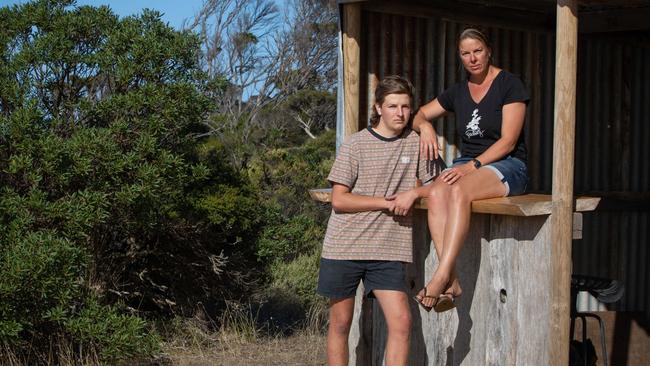
Simon led the Dudley United Football Club like it was his third son.
Under his wing he took young Aboriginal men from Central Australia on annual cultural exchanges.
These gifted but raw sportsmen were given the chance at a different life in the supporting surrounds of a close-knit and successful footy club.
For the past two years, Simon managed this exchange program with dogged determination; finding housing, sorting work and finances, giving direction and support, providing a safe and happy environment.
Once the footy games finally started each Saturday – after all the weekly planning, taxiing, counselling, and volunteering – there he’d be; behind the goals with his scorecard. Rain, hail or shine.
Goal umpiring duties must have provided a rare moment of solace for Simon but only if the opposition were kicking to his end.
Nothing made him happier than watching the footy sail over the top of his head if it came from the boot of one of his beloved Eagles players; he bled green and yellow.
Simon ran 10,000 sheep on a successful 1400ha farm he worked with Eloise and his father, Barry.
He was regarded as a talented shearer, albeit a perfectionist.
The Red Banks farm – with a stunning view across Nepean Bay to Kingscote – was a source of pride but Kayne says his father was happier away from it.
The stress of running such a large operation took its toll but he was committed to providing for his wife and sons.
Family was his guiding force and Eloise his life partner, having met during a school tennis program more than 30 years ago.
Simon’s last profile picture on Facebook followed Eloise’s induction as a Life Member of the Dudley United Netball Club, a portrait of himself with wife and sons. He captioned the photo: “My three faves.”
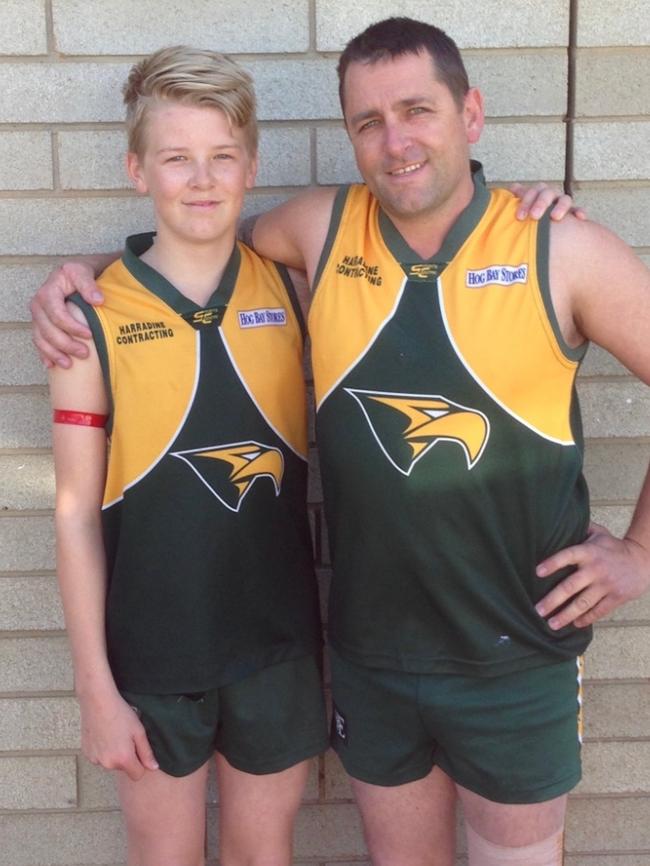
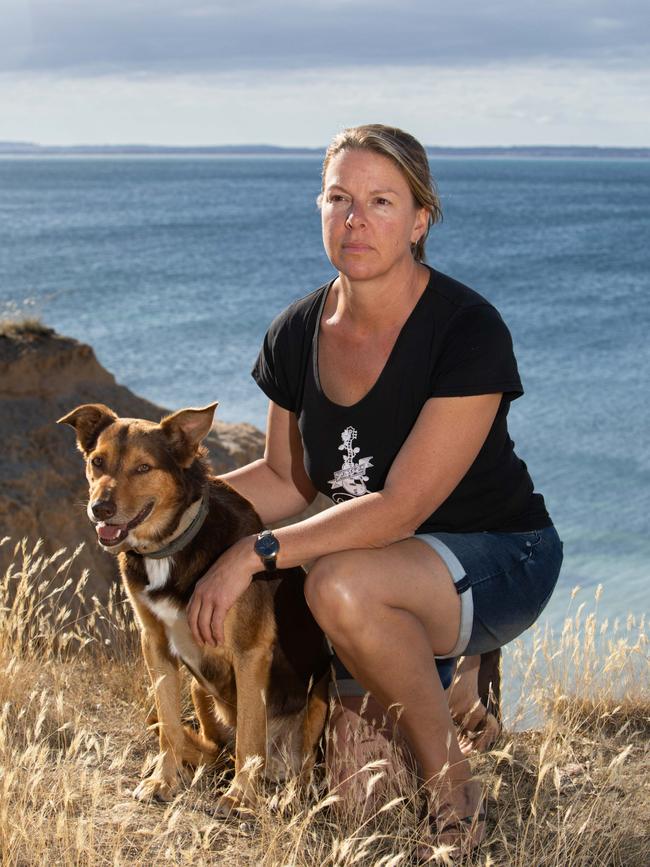
In one of the bravest acts seen in the history of the Kangaroo Island Football League, Toby and Kayne took to the field for last year’s A-grade Preliminary Final, just two days after Simon’s death.
“He would’ve wanted us to play and try our best under any circumstances,” Toby says.
“It just felt like we had to honour him. It was very daunting and there was a lot of pressure.
“When we had a moment’s silence it was so surreal. I didn’t even cry, I couldn’t feel anything.
“I just wanted to play the game that Dad always wanted me to play.”
Kayne says his younger brother played the game of his life.
“He was unreal and I was so proud,” Kayne says. “He was taking down blokes way bigger than him. I was stoked with that day – it couldn’t have gone any better.”
With the 2022 season soon to kick off, Toby is back on the training track like his old man would have wanted.
The club’s Volunteer of the Year Award has now been named in Simon’s honour.
In the wake of Simon’s passing the community, while still struggling to understand it, has rallied in support of each other.
Significantly, they are working to encourage others who might be struggling to speak up.
Lenny Deacon recently completed a 24-hour Shearathon with friend Declan Hardy-Corby to raise money for the Breakthrough Mental Health Research Foundation, which conducts research into the causes of mental illness; an organisation Simon supported before his death.
Inside the shed where Simon once plied his trade, the pair shore more than 1200 sheep and raised upwards of $43,000.
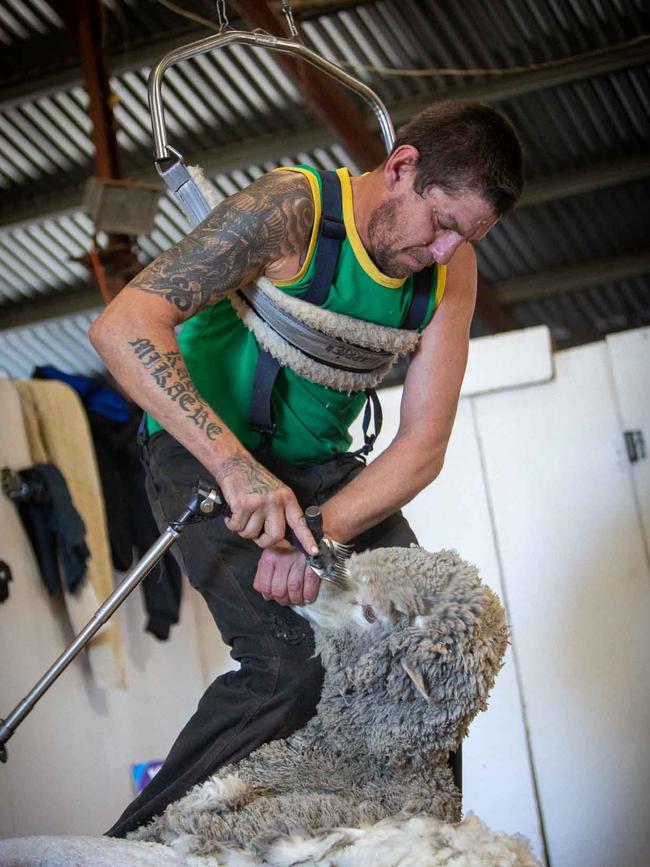
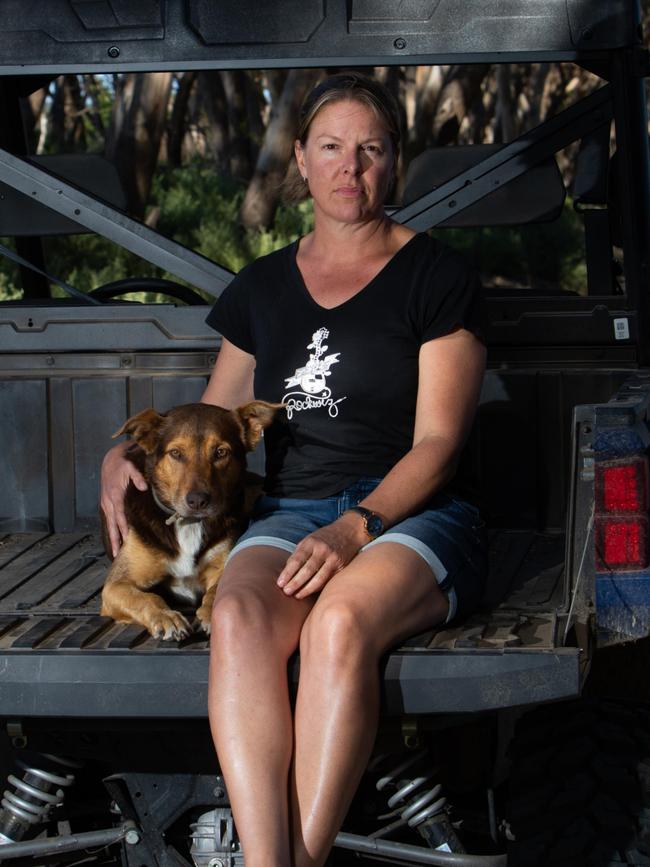
Eloise says it’s a difficult conversation the community must continue to have so that no one is again forced to suffer in silence.
“We want to keep that conversation going to prevent further heartache for anyone,” Eloise says.
“I don’t want anyone to have to go through what we’ve been through. We might seem like we’ve been strong since Simon’s death, but we weren’t given a choice.
“Men, young and old, can be programmed by their parents to toughen up and not to express emotions. I think it’s important to talk about the hard things.
“There is a reason they are hard to talk about. They need to be talked about the most.”
Toby – who still lives with Eloise on the farm – says his friends are helping him through the grief after he initially cut himself off from the outside world.
“I’m getting closer to who I used to be,” he says.
“Hopefully people who are depressed don’t get to the stage where they feel like they need to leave this earth.
“They’ll see what kind of impact doing that can have.
“I’ll probably never be quite the same but hopefully I’ve got some new strengths.”
Kayne, who is completing an apprenticeship in Adelaide, has signalled his intentions to take over the family farm in the future.
He hopes there will be a phasing out of “the old-school man mentality, where they don’t want to talk about their feelings because they’re afraid of feeling weak”.
“I can see with my own friends that we talk about our feelings quite well. It’s a cultural shift – it takes a while.”
Before his death, Eloise says Simon had started talking to mates about mental health.
“One of those friends decided to seek his own help as a result,” she says.
“Simon felt like he made a difference which is a really nice thing to get out of your life, I think.”
Simon’s final public posting on his Facebook page was: “Kind thoughts and hopes”.
No one will know exactly what Simon felt when he wrote those words, but it can now act as a rallying cry for a community to do everything in its power to ensure such a tragedy is never repeated.
If you are in crisis or need support:
● Lifeline: 13 11 14, lifeline.org.au
● Beyond Blue: 1300 224 636 beyondblue.org.au/forums
● MensLine Australia: 1300 789 978 mensline.org


